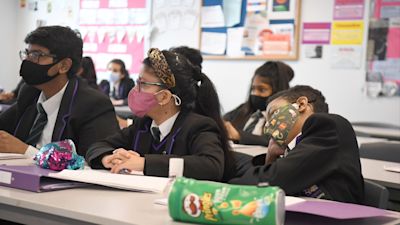Covid: School bubbles expected to end 'as part of step 4 of coronavirus lockdown easing' amid record pupil absence

ITV News Political Reporter Shehab Khan reports on the latest school bubble developments
School bubbles and self-isolation rules could come to an end as part of step 4 of Covid-19 lockdown lifting in England, the education secretary has said amid record numbers of pupil absences.
Gavin Williamson told MPs on Wednesday he expects the government "to be able to confirm plans to lift restrictions and bubbles as part of Step 4".
In England, step 4 is due to take place on July 19 - just a few days before many schools break up for the summer holidays - and will see an end to social distancing restrictions across the country and most limits on venues lifted.
Answering an urgent question on the impact of coronavirus on young people’s attendance in education, Mr Williamson told the Commons: “Some restrictions remain in place in schools.
"What I want to see is these restrictions including bubbles removed as quickly as possible along with wider restrictions in society.
“I do not think it is acceptable that children should face greater restrictions over and above those of wider society especially since they have given up so much to keep older generations safe over the last 18 months."
'Our elderly have been protected from Covid but often our youngest have been forgotten'
Physical punishment on a child increases behaviour difficulties, new research suggests
Mr Williamson acknowledged "there are still too many children having their education disrupted no matter how good remote education is that they are receiving".
He said he expects children “would not be facing” bubble arrangements in September.
The statement from the education secretary comes as figures published on Tuesday showed one in twenty pupils in England were currently not in school due to Covid-19 related reasons.
Joshua Stokes discusses the current movements around ending bubbles in schools
The number of absences has been rising sharply in recent weeks coinciding with the steep rise in Covid cases as the Delta variant spreads across the UK.
Currently, if a pupil in a bubble tests positive for Covid then the whole group must self-isolate at home.
The definition of what makes up a bubble can be defined by the school, but they must ensure the bubbles do not mix, which can create logistical headaches for already overstretched staff.
Can the education secretary guarantee children will not be subject to school bubbles in September?
Often these bubbles are entire year groups, or in some cases whole schools.
Downing Street appeared to say on Wednesday that if a case of Covid is detected in a whole school bubble they may not need to send everyone home.
A spokesperson for the prime minister said: “There is guidance available to schools and that is something that is being picked up through the regional schools commissioner teams, which does set out that it is not a requirement necessarily that whole school bubbles need to isolate.
'I do not think it is acceptable that children should face greater restrictions over and above those of wider society'
“The bubble system does make it easier to identify those who may need to self-isolate but the amount of people who might need to be sent home will depend on a case by case basis.”
Asked whether that meant whole bubbles should not be sent home, the spokesperson said: “The exact number of people who need to isolate will depend on the situation.”On Tuesday the Children's Commission for England Dame Rachel de Souza said there was an urgent need for children to get back to normal as lockdown restrictions had been a “real trauma” for many young people.
Listen to our coronavirus podcast:
Gavin Williamson also told MPs he wants to end regular Covid-19 testing for schoolchildren “at the earliest and most realistic possible stage”.
He said testing has been an “incredibly important tool” in helping schools return and the issue is “under review”, adding: “Much longer-term do I see testing as something that we expect children to continuously do always in the future?
"No I don’t, and I ideally want to move away from that at the earliest and most realistic possible stage.”